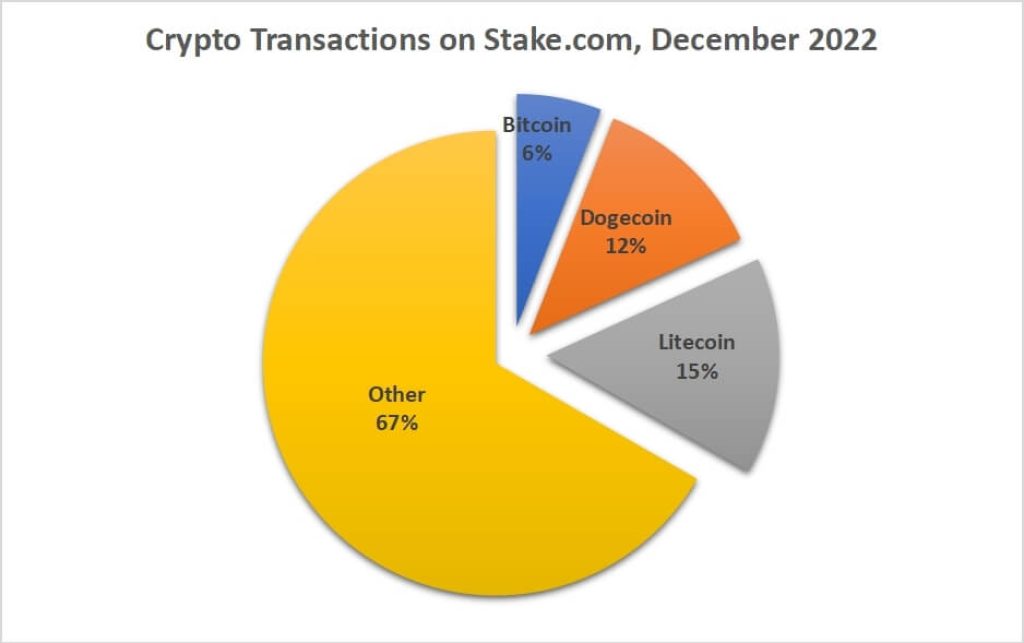
Bitcoin, the world’s largest cryptocurrency, has seen widespread adoption in recent years for financial transactions and online gambling. According to billionaire Ed Craven, 6% of Bitcoin transactions in December 2022 were made via his online casino, Stake.com.
As mentioned in a recent tweet, Craven stated that the crypto casino Stake.com is responsible for an impressive 5.9% of all Bitcoin transactions, 12.3% of all Dogecoin transactions, and 15.1% of all Litecoin transactions worldwide as of December 2022. While Bitcoin tanked in value in 2022, average daily general transactions remained relatively high at over 200,000.
The report came amid the continued rise of crypto gambling, which experts believe will still be the case in the coming years. A market analysis reported that the online gambling industry may grow to USD$172 billion by the end of 2030 from roughly USD$60 billion in 2021. Crypto gambling alone is expected to grow to USD$93 billion next year.

What you'll learn 👉
Betting with Bitcoin
The concept of wagering digital currency in place of cash on hand has been around for as long as online gambling. Naturally, playing casino games on a website requires a viable means of betting without forking over physical cash. The first online casinos in the mid-1990s accepted credit and debit cards for setting wagers and claiming prizes.
However, according to a report by the U.S. Government Accountability Office, most credit card providers tend to prohibit people from using their cards in online gambling. The report said such restrictions also extend to online casinos, often refusing their merchant applications. As a result, the gaming industry’s projected revenues went down the year after this report was published.
Then, in 2009, Satoshi Nakamoto introduced Bitcoin to the world. This mother of all cryptocurrencies is designed to work like traditional currency but without banks and financial institutions as intermediaries. Instead, algorithms called “proof of work” will confirm crypto transactions in their stead.
In the case of crypto gambling, Bitcoin wasn’t created to be the next casino currency. But given that credit cards continue to reject gambling transactions, online casinos looked to cryptos to fill a critical void in payment options.
As the list of cryptos grew, so did the number of online casinos that adopted them. According to the nonprofit organization Ohio for Responsible Gambling, about 50% of all transactions made with Bitcoin alone involve gambling.
Additionally, one report showed that crypto bets had increased more than twofold between 2021 and 2022. Of over a third of wagers made using cryptocurrencies, over 70% did so with Bitcoin. Other widely-used cryptos include Ethereum, Litecoin, and Dogecoin.
Among these casinos is Stake.com. The gambling platform has an impressive inventory of slot games, featuring over 3,000 games that gamblers play—with new ones released every week like clockwork. Aside from the ones mentioned earlier, it also accepts Ripple, Tether, Binance, Shiba Inu, Tron, and more.
Secure playing
The crypto gambling industry frequently touts anonymity and security as among the key benefits of wagering with crypto. While no form of payment is 100% protected, crypto is among the most secure—provided users take the necessary precautions—thanks to the technology behind it.

The “proof of work” model cryptos operate on hinges on cryptography; in fact, it forms half of the term “cryptocurrency.” Cryptography isn’t so much the actual tech, as MIT Institute Professor Ronald Rivest puts it, “the practice and study of techniques for secure communication in the presence of adversarial behavior.”
The adversarial behavior can be none other than cybercrime, specifically credit card fraud. While also a secure form of payment, credit cards are prone to practices like cardholders giving away their card numbers to shady sites or misplacing their cards. In such cases, it won’t be difficult for cybercriminals to claim these cards or their numbers as their own.
Experts paint a bleak picture for the credit card sector in the coming years. The latest release of the Nilson Report estimates that credit card fraud might inflict as much as USD$408 billion in losses globally over the next decade. By comparison, an estimated USD$30 billion had already been lost during the first year of the pandemic.
Cryptos aim to curb such risks by dispersing the source of sensitive information, which is where blockchain comes in. Transactions are stored in digital ledgers spread across multiple computers. Even if a hacker cracks one terminal open, the information stored there is only a fragment of the bigger picture. Tracking down the rest of the fragments is often difficult, if not impossible.
Transactions in crypto gambling aren’t too different from those in other applications, though they fall into one of two types. The more prevalent type only employs crypto for dispensing winnings and doesn’t allow waging with crypto, instead converting players’ cryptos into cash.
The second type offers the real crypto gambling experience, allowing players to bet and receive winnings with crypto. However, only an estimated one in four crypto casinos is of this type, of which one in ten isn’t regulated by a government agency like the U.K. Gambling Commission.
As for anonymity, it can be both a boon and a bane to players. Most crypto casinos don’t require players to submit pertinent documents when signing up for an account, though they may collect personal information as per their privacy policies. Because of this, players can keep details about their winnings and other aspects hidden.
That said, experts advise caution on this front, as anonymity may end when the casino commits something illegal, such as failing to deliver on a player’s winnings. Players may have no choice but to report such activities to authorities, but it might not be an option if unregulated casinos are involved. They advise checking an online casino’s reputation before anything else.
Speedy, low-fee transactions
Regulars in brick-and-mortar casinos often frown upon paying withdrawal fees—and they’re by no means chump change. According to one casino blog, the fees usually range between 2% and 10% of total winnings, though some may charge higher. Imagine taking home only USD$900 of your USD$1,000 winnings because of a 10% fee.
As upsetting as it may be, the fees are for the payment system managing the transaction. In most cases, the payment system dictates the rates, not the casino, which isn’t favorable to the latter. Experts believe two major reasons for this are the risk of cyberattacks and legal consequences if a payment system was used for money laundering.
It doesn’t help that players have to wait around a week before receiving their winnings. Payment systems scrutinize every transaction before sending; all the more reason to do so if the payout is immense. Weekends and holidays can extend the wait.
The high fees and potentially long wait times for withdrawal have resulted in players flocking to crypto casinos in droves. Although they still charge withdrawal fees and require time to facilitate the transactions, they aren’t as substantial.
Based on a forum thread in BitcoinTalk.org, the fees of most crypto casinos change on a whim. Those with fixed fees normally don’t go beyond USD$10 worth of Bitcoin, while others don’t charge any fees (subject to special conditions).
Blockchain technology has also made transactions much faster because of the algorithm handling checks and other functions. Some crypto casinos enable players to cash in on their winnings right away. Those with wait times range from several minutes to a few hours.
Sometimes, the wait times depend on the player’s preferred crypto. Cashing out with Bitcoin can take between 10 to 20 minutes, Litecoin in 10 minutes, and Dogecoin in up to almost an hour. However, these figures don’t account for other factors like the casino’s policies, block times, and blockchain confirmations.
Twitch’s role
Crypto gambling being broadcasted on streaming platforms, most notably Twitch, has contributed to the industry’s rise. Data from SullyGnome, a third-party Twitch data tracker, showed that the Slots category enjoyed high average and peak viewership during the pandemic. One day in July 2022 reached an all-time high at nearly 300,000 views and 100,000 average views.
Even though Twitch imposed a partial ban on gambling streams last October, crypto casinos are still riding on the popularity wave created by streamers. Big names like Tyler “Trainwrecks” Niknam and Felix “xQc” Lengyel stream themselves wagering millions on slots, showing their huge wins and losses before their millions-strong fanbase.
The fact that such streamers can afford to place huge wagers on luck-based games is credited to the lucrative sponsorship deals they receive. In one stream, Trainwrecks admitted to receiving a USD$360-million deal from a crypto casino, which he used the money to stream his slots games. Critics are skeptical of this claim due to the lack of a detailed rundown.
Following Twitch’s ban, Trainwrecks reacted with distinctive exasperation, calling the Amazon-owned company “corrupt” and announcing plans to create a new streaming platform that would allow gambling streams. Reports cited Kick.com as the platform in question, but a Washington Post interview last December confirmed that he still intends to launch his own platform.
These sponsorships have worked as intended, enticing more people to crypto-gamble. However, as a Bloomberg report last August explained, not everyone realizes the ramifications of betting huge sums without a wealthy backer to offset their losses.
All the while, the drawn-out gambling drama on Twitch continues. Recently, another streamer, DNP3, admitted to gambling away the funds for several crypto projects, including his charity-focused CluCoin, which caused its value to drop by over 60%. His confession on Twitter has been viewed 2.4 million times and received over 1,800 comments; some are disparaging, while others call for him to get professional help.
Of interesting note is that DNP3’s case shares some similarities with another high-profile case that became the last straw for Twitch. Last September, Twitch streamer Abraham “Sliker” Mohammed admitted to swindling fans and fellow streamers out of their money to fuel his gambling binge. It’s estimated that he collected between USD$200,000 and USD$300,000.
Crypto-fueled gambling addiction can be as dangerous as any other addiction, if not deadly. As cryptos are digital currencies, it’s easy for players to credit their spending without any physical cash. There’s no empty wallet in their pockets to get them to stop when obligated to, something that brick-and-mortar casinos can do.
Given such risks, crypto casinos take steps to mitigate a player’s risk of falling into the addiction trap. They provide links to professional services that help people out of their unhealthy gambling binge. There’s also blocking software that restricts access to specific online casinos, which may be enough for some people to deter them from further gambling.
Investing amid the decline
The risk of addiction isn’t the only issue for the crypto gambling sector. Crypto’s decentralized nature is a double-edged sword; the lack of involvement by a financial institution is a downside when crypto trends go south.
The fact that every altcoin in circulation is based on a single crypto—Bitcoin—can magnify the effect of a crypto market crash. According to market data from CoinDesk, Bitcoin’s value has been dropping since reaching its record high of nearly USD$70,000 in November 2021. As of this writing, it’s valued at below USD$16,800—a drop of 76% in a little over a year.
A lower-valued Bitcoin means players have less to bet in an online casino, and the industry has no reason not to be aware. If current trends persist throughout 2023, people will be prompted to hold onto their cryptos until the market becomes favorable again.
Amid the downward spiral, a report by The New York Times stated that people, particularly “hardcore Bitcoin evangelists,” continue investing in Bitcoin because it’s a safer investment compared to unstable ones or downright scams. There’s no reason to believe that they aren’t aware of the crypto’s declining value, but they purport that it’s the usual volatility at work.
If anything, the numerous scams and issues over the decade can be considered learning curves for investors and policymakers. They’re learning the dos and don’ts of crypto investment and implementing them into legal frameworks.
Crypto asset regulation is, if not a top priority, on the agenda of the Group of 20 (G20) nations. Host country India has looked into moving against unbacked cryptos, eliminating speculation as a determiner of value in favor of a backed asset. Meanwhile, the European Union last November published its first Markets in Crypto-Assets (MICA) Regulation.
Experts theorize that confidence in crypto will increase as governments and political blocs move more quickly in regulating crypto. That confidence will be passed on to the various markets that utilize them, including crypto gambling. That said, there’s still much work to be done.
Conclusion
The report’s findings highlight the growing trend of Bitcoin usage in the online casino industry, particularly at Stake.com. While there are potential risks to consider, the benefits of using Bitcoin for online gambling make it an attractive option for many users.







